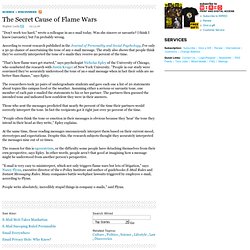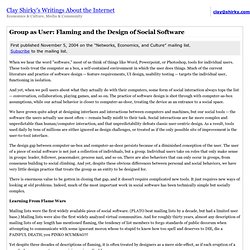

Pbem. Rumsfeld. Diplomacy. GuerrillaMail.com » Disposable Temporary E-Mail Address. News: "Don't work too hard," wrote a colleague in an e-mail today.

Was she sincere or sarcastic? I think I know (sarcastic), but I'm probably wrong. According to recent research published in the Journal of Personality and Social Psychology, I've only a 50-50 chance of ascertaining the tone of any e-mail message. The study also shows that people think they've correctly interpreted the tone of e-mails they receive 90 percent of the time. "That's how flame wars get started," says psychologist Nicholas Epley of the University of Chicago, who conducted the research with Justin Kruger of New York University.
The researchers took 30 pairs of undergraduate students and gave each one a list of 20 statements about topics like campus food or the weather. Those who sent the messages predicted that nearly 80 percent of the time their partners would correctly interpret the tone. At the same time, those reading messages unconsciously interpret them based on their current mood, stereotypes and expectations.
Group as User: Flaming and the Design of Social Software. Group as User: Flaming and the Design of Social Software First published November 5, 2004 on the "Networks, Economics, and Culture" mailing list.

Subscribe to the mailing list. When we hear the word "software," most of us think of things like Word, Powerpoint, or Photoshop, tools for individual users. These tools treat the computer as a box, a self-contained environment in which the user does things. Much of the current literature and practice of software design -- feature requirements, UI design, usability testing -- targets the individual user, functioning in isolation. And yet, when we poll users about what they actually do with their computers, some form of social interaction always tops the list -- conversation, collaboration, playing games, and so on. We have grown quite adept at designing interfaces and interactions between computers and machines, but our social tools -- the software the users actually use most often -- remain badly misfit to their task. Learning From Flame Wars. New Scientist Breaking News - Email forwarding amounts to ritual gift exchange.
Forwarding a quirky email or an amusing link or video attachment to colleagues may seem innocent enough, but it is the modern equivalent of ritual gift exchange and carries with it similar social implications, say US researchers.

Email forwarding is a familiar part of modern email communications, and has spawned many an internet phenomenon, the Star Wars kid, the Numa Numa dance, and Oolong the rabbit to name just a few. Benjamin Gross at the University of Illinois, US, and colleagues studied email forwarding behaviour by conducting informal interviews among email users. He says forwarding emails plays a vital role in constructing and maintaining modern social ties, despite the phenomenon receiving scant attention from social scientists. Forwarding a genuinely amusing or interesting link to a friend, for example, shows that you are thinking of them and are aware of the sort of content they like, Gross says.
"Viral" marketing More From New Scientist More from the web (YouTube)